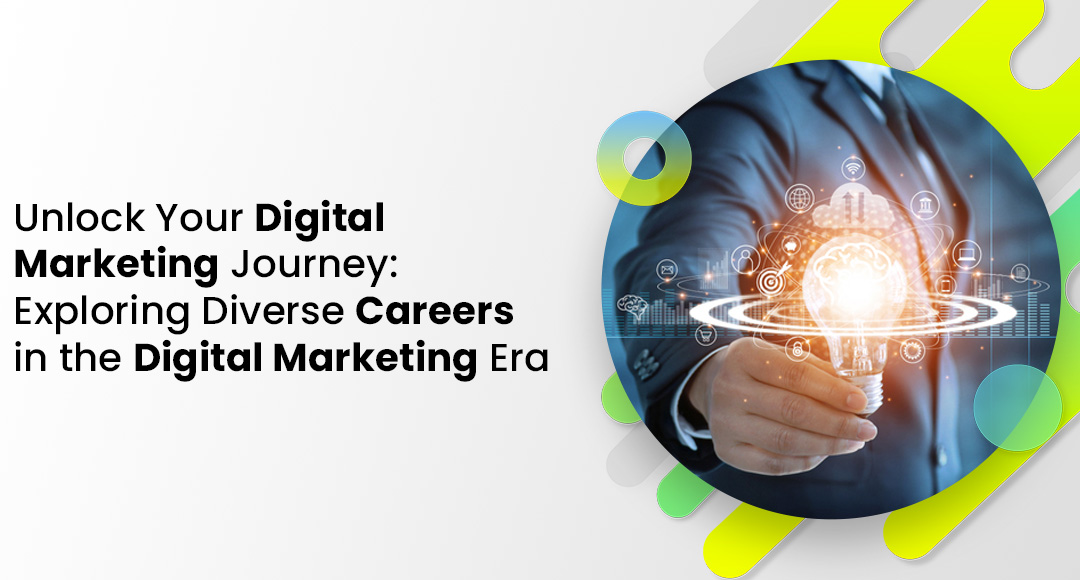In the vast expanse of the digital landscape, where technology intertwines with human connection, a realm of endless possibilities exists. Welcome to the world of digital marketing in 2023, where innovation dances with strategy, and creativity melds seamlessly with data-driven insights. Prepare to embark on a journey where brands break boundaries, consumers become collaborators, and the digital sphere becomes an immersive playground for engagement and growth.
In this era of boundless connectivity, the scope of digital marketing has evolved into an extraordinary tapestry of channels, platforms, and experiences. Every digital touchpoint has become an opportunity for brands to engage, entice, and enchant their audiences, from the screens illuminating our lives to the algorithms deciphering our preferences.
The era of mass communication has given way to a new era of one-to-one connections, where each interaction feels tailored, relevant, and meaningful. Gone are the days of one-size-fits-all approaches; personalisation has emerged as the bedrock of successful digital marketing campaigns. With advanced analytics and artificial intelligence, marketers can delve into the depths of consumer behavior, crafting hyper-targeted messages that resonate deeply with individuals.
But digital marketing is no longer confined to the confines of screens alone. The rise of immersive technologies has opened up a realm of virtual and augmented realities where brands can transport consumers to extraordinary realms of imagination and possibility. Whether exploring virtual storefronts, engaging in interactive experiences, or discovering products through augmented reality, the digital sphere has become a gateway to endless adventures and delightful encounters.
In 2023, the role of digital marketers extends far beyond mere advertising. It is about weaving narratives that captivate and inspire, leveraging social media platforms to foster communities, and embracing influencer collaborations that blur the lines between endorsement and genuine connection. Authenticity reigns supreme as consumers seek real experiences, honest storytelling, and purpose-driven brands that align with their values.
The future of digital marketing lies in the convergence of creativity and technology, where human ingenuity fuses with data-driven insights to create unforgettable experiences. As we navigate this dynamic landscape, marketers must adapt swiftly, experiment fearlessly, and harness the power of emerging trends to stay ahead of the curve.
So, fasten your seatbelt and prepare to embark on an exhilarating journey through the realm of digital marketing in 2023. From the domains of personalization and immersive technologies to the art of authentic storytelling and purpose-driven campaigns, this is where innovation meets strategy, and endless possibilities await those who dare to explore.
Use of Digital Marketing in Companies
Companies use digital marketing to expand their reach, target specific audiences, optimize costs, leverage data-driven insights, personalize customer experiences, build brand awareness, provide efficient customer support, and stay ahead of the competition. By harnessing the power of digital channels, companies can unlock new growth opportunities, drive business success, and foster meaningful connections with their target audience. Here are some key reasons why companies embrace digital marketing:
- Reach and Targeting: Digital marketing provides an unparalleled reach to a global audience. Companies can target specific demographics, interests, and behaviors through various digital channels, ensuring their message reaches the right people at the right time. This level of precision targeting helps maximize the effectiveness of marketing efforts, resulting in higher conversion rates and return on investment (ROI).
- Cost-Effectiveness: Compared to traditional marketing methods like print or TV advertisements, digital marketing often proves to be more cost-effective. It offers various options, including pay-per-click (PPC) advertising, email marketing, and social media campaigns, which can be tailored to fit various budgets. Additionally, digital marketing allows for better tracking and measuring results, enabling companies to optimize their strategies and allocate resources more efficiently.
- Data-Driven Insights: Digital marketing provides a wealth of data and analytics that allow companies to gain valuable insights into customer behavior, preferences, and trends. By leveraging tools like website analytics, social media metrics, and customer relationship management (CRM) systems, companies can make informed decisions and fine-tune their marketing campaigns based on real-time data. This data-driven approach enables continuous optimization and a deeper understanding of the target audience.
- Personalization and Customer Engagement: Digital marketing empowers companies to create personalized customer experiences. By leveraging customer data and segmentation, companies can deliver targeted content, offers, and recommendations, enhancing the overall customer experience. This customized approach increases customer satisfaction and fosters stronger customer engagement, loyalty, and advocacy.
- Brand Building and Awareness: Digital marketing enables companies to build and reinforce their brand presence in the digital realm. Through consistent messaging, storytelling, and visual identity across various digital channels, companies can shape their brand image and connect with their target audience on a deeper level. Digital marketing tactics such as content marketing, social media management, and influencer collaborations can help amplify brand awareness and establish thought leadership within specific industries.
- Enhanced Customer Support: Digital marketing allows companies to provide instant and proactive customer support. Companies can promptly address customer queries, provide assistance, and resolve issues through social media platforms, chatbots, and email automation. This level of responsiveness and accessibility strengthens customer trust and satisfaction, leading to long-term customer relationships and positive word-of-mouth referrals.
- Competitive Advantage: In today’s digital landscape, companies need to embrace digital marketing to remain competitive. Many industries have experienced a significant shift toward online purchasing and digital interactions, making it essential for companies to establish a strong digital presence. By embracing digital marketing strategies early on, companies can gain a competitive edge, capture market share, and adapt to evolving consumer preferences.
Scope of Digital Marketing
While social media platforms play a crucial role in digital marketing, marketers explore several other avenues to engage with their target audience and achieve their business objectives. The scope of digital marketing extends far beyond social media, encompassing a wide array of channels, strategies, and technologies. Let’s delve into the various dimensions of digital marketing, including social media and beyond:
- Social Media Marketing: Social media platforms like Facebook, Instagram, Twitter, LinkedIn, and YouTube have become integral to digital marketing strategies. Companies leverage these platforms to build brand awareness, engage with their audience, share content, run targeted advertising campaigns, and cultivate communities. Social media marketing enables direct customer interaction, facilitates user-generated content, and fosters brand advocacy.
- Search Engine Optimization (SEO): SEO is optimizing websites and content to improve organic search engine rankings. SEO is crucial in driving targeted traffic and establishing a strong online presence. Effective SEO strategies involve keyword research, on-page optimization, technical optimizations, link building, and content marketing. Companies can enhance their online visibility and drive organic traffic by understanding search algorithms and user intent.
- Search Engine Marketing (SEM) and Pay-Per-Click (PPC) Advertising: SEM involves paid advertising on search engine results pages (SERPs) to increase visibility and drive targeted traffic. SEM and PPC campaigns provide immediate visibility and enable precise targeting based on search queries. PPC advertising allows companies to bid on keywords and pay only when users click on their ads. Google Ads is a popular platform for PPC advertising, offering various ad formats like text ads, display ads, and shopping ads.
- Content Marketing: Content marketing involves creating and distributing valuable, relevant, consistent content to attract and retain a defined audience. By providing informative and engaging content, companies can position themselves as thought leaders, drive organic traffic, and nurture customer relationships. It encompasses blog posts, articles, videos, infographics, podcasts, whitepapers, and more. Content marketing often integrates with digital marketing strategies like SEO and social media.
- Influencer Marketing: Influencer marketing involves partnering with influential individuals on social media or other digital platforms to promote products, services, or brand messages. Influencer marketing campaigns can range from sponsored content to collaborations, giveaways, and influencer takeovers. Influencers have dedicated followers who trust their recommendations, making it an effective way to reach and engage with specific target audiences.
Career in Digital Marketing
Digital marketing offers diverse career opportunities for individuals passionate about leveraging technology, creativity, and data to drive business growth. As the digital landscape continues to evolve, so do the roles and responsibilities within the field. Here are some critical careers in digital marketing:
- Digital Marketing Manager: Digital marketing managers oversee a company’s overall digital marketing strategy and implementation. They are responsible for driving brand awareness, customer acquisition, and engagement through effective digital marketing tactics. They develop and execute marketing campaigns across various channels, manage budgets, analyze data, and collaborate with cross-functional teams.
- Social Media Manager: Social media managers are responsible for creating, executing, and managing brand social media strategies. They develop content calendars, engage with followers, monitor social media trends, and analyze performance metrics. Social media managers understand various platforms, optimize content for maximum reach and engagement, and work toward building a strong brand presence on social media.
- SEO Specialist: SEO specialists optimize websites and content to improve search engine rankings and drive organic traffic. They conduct keyword research, implement on-page and technical SEO strategies, analyze website performance, and track SEO metrics. SEO specialists stay updated with search engine algorithms, identify opportunities for improvement, and work towards increasing the visibility and relevance of websites in search results.
- Content Marketer: Content marketers are responsible for creating and managing content that aligns with the brand’s marketing goals. They develop content strategies and produce engaging blog posts, articles, videos, and other forms of content. Content marketers often collaborate with other teams, conduct research, optimize content for search engines, and leverage storytelling techniques to captivate and engage the target audience.
- Digital Marketing Strategist: Digital marketing strategists develop comprehensive digital marketing plans aligned with business goals. They conduct market research, identify target audiences, analyze competitors, and define key performance indicators (KPIs). Digital marketing strategists work closely with other teams to ensure integrated campaigns, track performance, and make strategic recommendations to optimize marketing efforts.
These are just a few examples of the many career paths available in digital marketing. Each role requires a unique set of skills, such as digital marketing knowledge, analytical abilities, creativity, communication skills, and adaptability, to stay current with evolving trends and technologies. Professionals in digital marketing often collaborate across teams, stay curious, and embrace continuous learning to thrive in this fast-paced and dynamic field.
Take Away
The demand for skilled digital marketing professionals is soaring as the digital landscape continues to expand and shape the business world. The opportunities are vast and diverse, from digital marketing managers orchestrating comprehensive strategies to social media managers curating engaging content and SEO specialists optimizing search visibility.
Whether you’re a data-driven analyst, a creative content marketer, or a strategic thinker, the world of digital marketing welcomes individuals with varied talents and expertise. It’s a realm where innovation meets strategy, storytelling converges with technology, and businesses can thrive by connecting with their audience on a deeper level.
So, leap into this exciting field, where you can unleash your creativity, leverage cutting-edge technologies, and make a tangible impact on brand growth and success. Your journey awaits! Embrace the ever-evolving digital landscape, seize the opportunity to shape the future, and embark on a rewarding career that combines your passion with the power of digital marketing.

